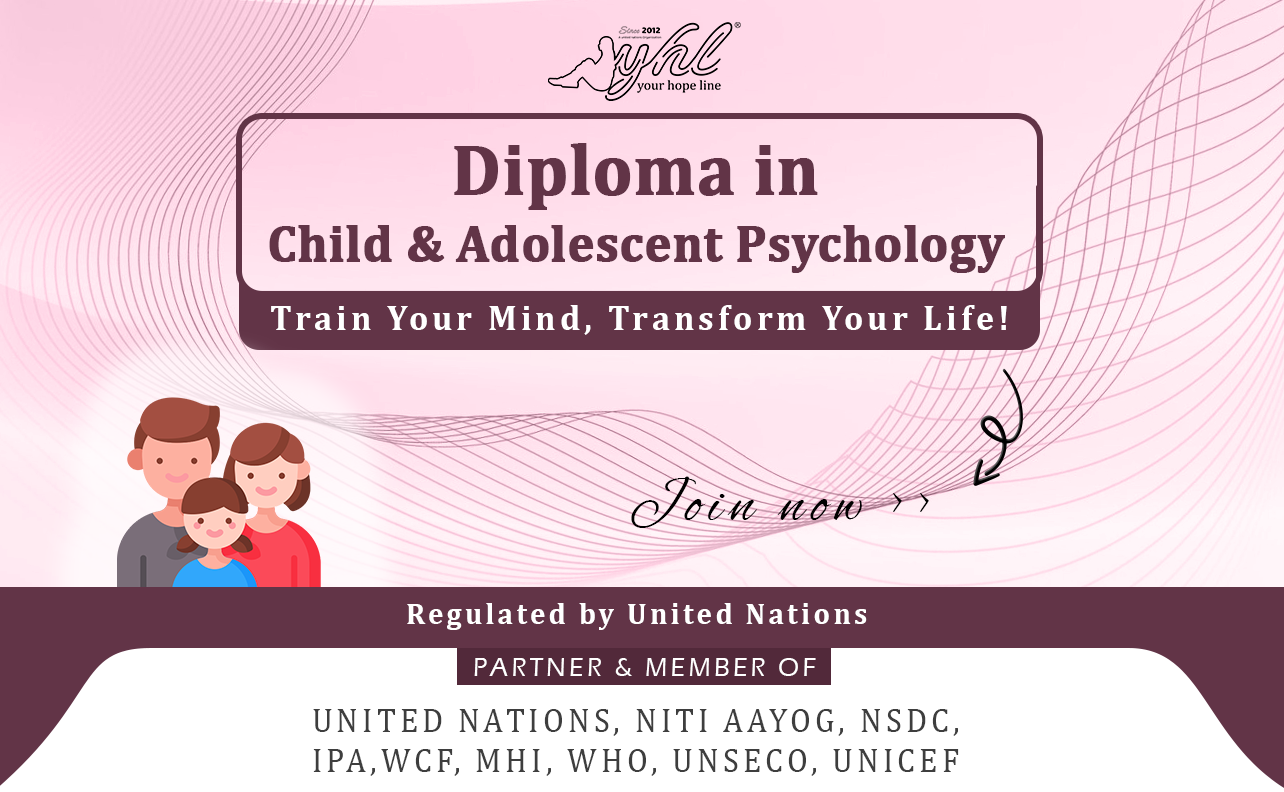
Diploma in Child & Adolescent Psychology – Your Hope Line
United Nations Recognized | Niti Aayog Recognized | ISO 29993:2017

United Nations Recognized

Niti Ayog Recognized

ISO
29993:2017
29993:2017

Registration Card – Available

Duration – Fexible

Printed Notes – Available

Certificate on Merit – not available

Community Access – Lifetime

Payment Mode – One time
- Duration : 6 months
- Mode : Self-Placed
- Price : ₹15,000
₹20,000 - CoM : not available
Parenting Coach
- 1. Science of Parenting - What drives it
- 2. Traditional Vs. Modern Parenting - What changed
- 3. 8 Parenting Mistakes - They innocently make
- 4. Parents' X-factors - Parents as individuals
- 5. Parents' Report Card - How much they scored
- 6. 5 Step Parenting Coaching - Universally practiced
- 7. 7 Modern parenting challenges & solutions
- 8. Growing with the child - Dynamic relationship
- 9. 6 ideal parenting practices – Safe parenting
- 10. Handling Mistakes - Anger, Ego, Guilt, social pressure
- 11. Having difficult conversation with child
- 12. Practicing - Sharing, Letting go, Right expectation
Child Psychology
- 1. Introduction to IQ tests
- 2. Developmental theories
- 3. Role of a child psychologist
- 4. Child psychology simplified
- 5. Development areas of a child
- 6. Attachment styles with parents
- 7. Factors in child’s development
- 8. Language & cognitive development
- 9. Reasons for learning child psychology
- 10. Role of parents
- 11. Child psychopathology
- 12. Scales & screening tools
- 13. IQ tests & its application
- 14. Genetics and abnormalities
- 15. Parents skill training modulation
- 16. Child & adolescent psychotherapy
- 17. Child Psychology Activity one
- 18. Child Psychology Activity two
Adolescent Counseling
- 1. Historical Perspectives on Adolescence
- 2. Contemporary Definitions and Conceptualizations
- 3. Cultural Variations in Defining Adolescence
- 4. Psychoanalytic Theories
- 5. Cognitive Theories
- 6. Socio-cultural Theories
- 7. Biological Theories
- 8. Physical Changes during Adolescence
- 9. Cognitive Development during Adolescence
- 10. Social and Emotional Development
- 11. Identity Formation and Self-Concept
- 12. Peer Pressure and Social Influence
- 13. Risk-Taking Behaviors
- 14. Mental Health Issues
- 15. Substance Abuse and Addiction
- 16. Parent-Adolescent Relationship
- 17. Family Systems Theory
- 18. Communication Patterns within Families
- 19. Impact of Family Structure on Adolescent Development
- 20. Conflict Resolution and Family Therapy Approaches
- 21. Person-Centered Counseling
- 22. Psychodynamic Therapy
- 23. Gestalt Therapy
- 24. Narrative Therapy
- 25. Cognitive-Behavioral Therapy (CBT) for Adolescents
- 26. Dialectical Behavior Therapy (DBT) for Adolescents
- 27. Solution-Focused Brief Therapy (SFBT) with Adolescents
- 28. Group Counseling and Support Programs for Adolescents
- 29. Digital Technology and Social Media Influence
- 30. Gender and Sexual Identity Exploration
- 31. Trauma and Resilience in Adolescence
- 32. Academic and career Counseling